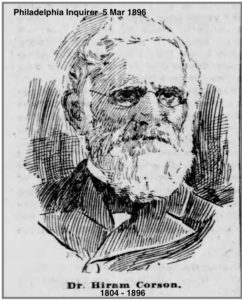This group, if group so few can be called, consisted of Jonathon Roberts and wife, of whom I have already spoken elsewhere, their four sons and their only daughter, Mrs. Sarah Tyson, William Jones and his wife, Rachel, and the two sons of William (by a former marriage), John and Rowland, the family of Rees Thomas of the Gulf, his son, William B. Thomas, who was an active member of our society in its very first year and as long as he lived, and his four daughters, who were all active in the cause, annually bringing the work of their hands as contributions, to be sold at the fair of the anti-slavery society, held every year in Philadelphia, to swell the funds of the society, and to be used to continue the crusade against slavery.
To the names of these few I may add that of Mr. Mordecai Moore, nephew of Jonathan Roberts; also Thomas Read and family, who resided for a while in that township, but who, like Mr. Moore, took part with the Norristown group on many occasions, as well as did the Robertses, and all of them might be added to that group, were it not that Upper Merion well deserved a group of its own fearless and ardent advocates for the right, so ardently did they labor in the cause, wherever and in whatever way they could be useful. But even in this band of conspicuous workers Mrs. Eliza Roberts, the wife of Jonathan, held a most conspicuous place. Well do I remember how our sympathies were aroused when, in a public meeting, she recited the case of a poor slave mother, who, with her four children, were about to be sold, and how she plead for help to rescue them from the block of the slave auctioneer, ready to sell them to a life of bondage, separated for all time from each other. As I have, through the half century that has since passed, shared the common fate of old people—forgetfulness—I requested Mrs. Tyson to write me a brief account of the successful efforts of her mother to rescue them from the horrible fate which was threatening them. This she has kindly done in the following letter to me:
In 1847, Mrs. Eliza H. Roberts visited friends in Virginia, the home of her early life and one much cherished by her, had the blast of slavery, with all its environments and heart-rending appeals been extinguished from her soil. It was her misfortune to find among her friends the sad, sad story of accumulated debt, to such an extent that the poor, suffering slave was the first to answer to the auctioneer’s hammer one little girl was to be the first victim. With harrowed feelings, they sought to find a remedy. No response came to her but to pay the price and bring her to Pennsylvania, where she could be reared under the influence of freedom; otherwise her fate would have been to be sold to the far South and separated from all that was dear to her. The shadow of this unjust system stilt haunted the household, and more victims were threatened with the auction block. The next was the mother of the little girl, a woman of 35 years. Letters poured in beseeching Mrs. Roberts to again put forth her hand and advance the money, and she would willingly serve her until the debt should be cancelled, She had other children; two daughters, old enough to be serviceable, and two little sons. She entreated for the deliverance of all. An appeal was made to the anti-slavery society of Philadelphia to know if any funds could be obtained for their relief; but the answer came “They could not take isolated cases, their work was for the removal of the evil.” The anguished-stricken mother was almost crazed with grief, and rather than be separated from her children, determined to sever her hand from her body, that she might be condemned and no longer saleable. The good angel of mercy came to her relief, and hope delayed her resolve. Mrs. Roberts consented to advance the money for the mother and the two daughters. She determined to appeal to the philanthropic hearts of the people and found a sympathetic response, and, within the limits of this county, was enabled to make up the sum of $300, the price asked for the two boys, she advancing $1250 for the female portion of the family. The kind co-operation of Mr. George Corson, of Plymouth, who was ever ready to extend the cup of cold water to suffering humanity, materially aided, by calling a meeting near his house, where the case was stated and a most encouraging sum collected. The arrival of the happy family in a land of freedom can scarcely be described. They remained some time with Mrs. Roberts, but eventually settled in Norristown, where the remaining descendants still live. It is meet to say that Emma Jackson, though blind for fifteen years, never was known to murmur, but calmly submitted herself with a most trustful spirit to her misfortune. The youngest son fell at Petersburg and the daughters were victims to consumption. She died at the advanced age of 82 years, respected by all who knew her.”
Here we have the authentic record (not a mere tradition), by one who was a living witness of the anxiety and trials of Mrs. Roberts in her successful efforts to rescue a family from lives of great suffering—a noble work that brought to the donor the gratitude of the rescued, and the respect of all who knew the noble woman who was the benefactor of the oppressed.
Work Cited: Corson, Dr. Hiram. “Abolitionists in Upper Merion.” Historical Society of Montgomery County, vol. II (1900): 38-40. Print.
Dr. Hiram Corson (1804-1896) was a practicing physician, and an advocate for abolitionism and women in medicine. He lived in Plymouth Meeting, Montgomery County, Pennsylvania.

